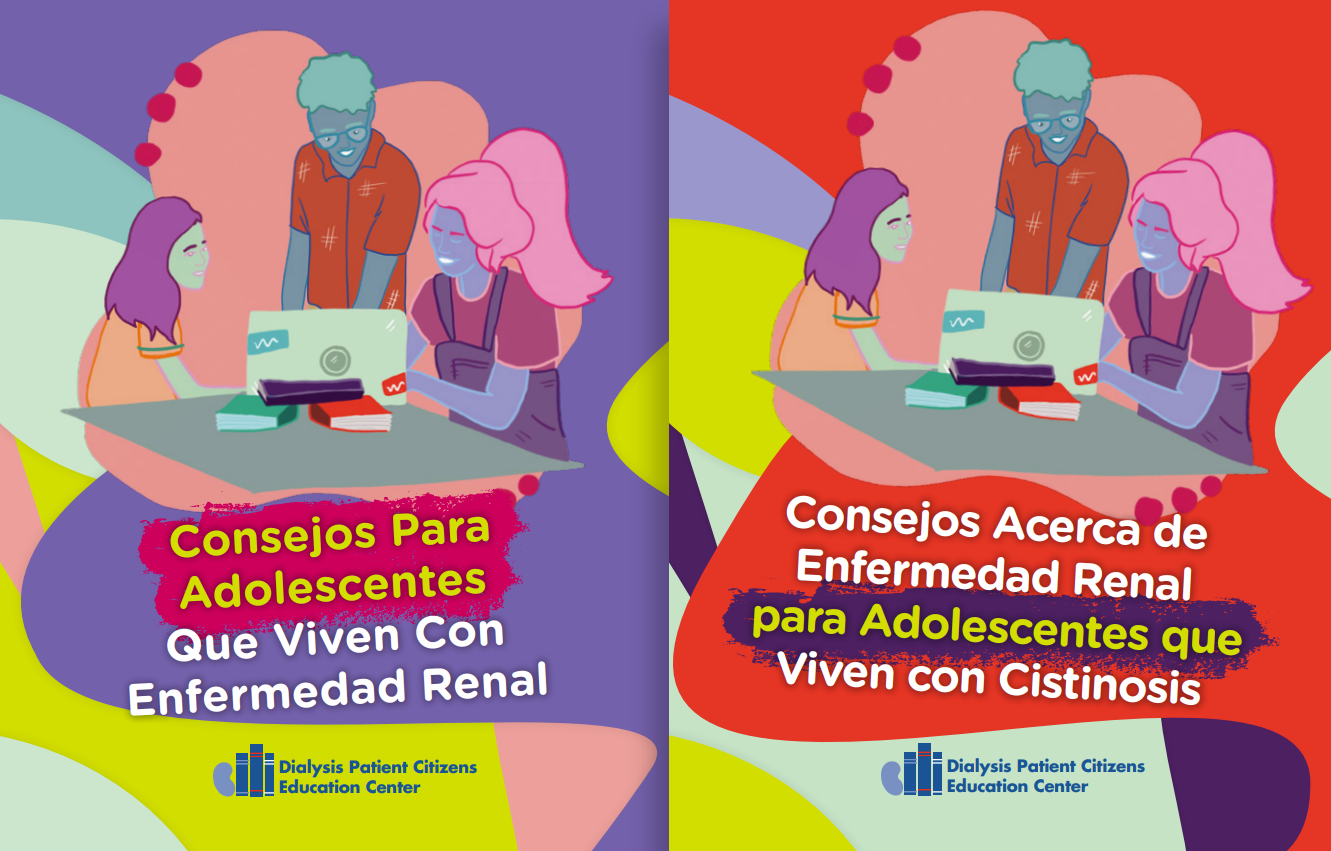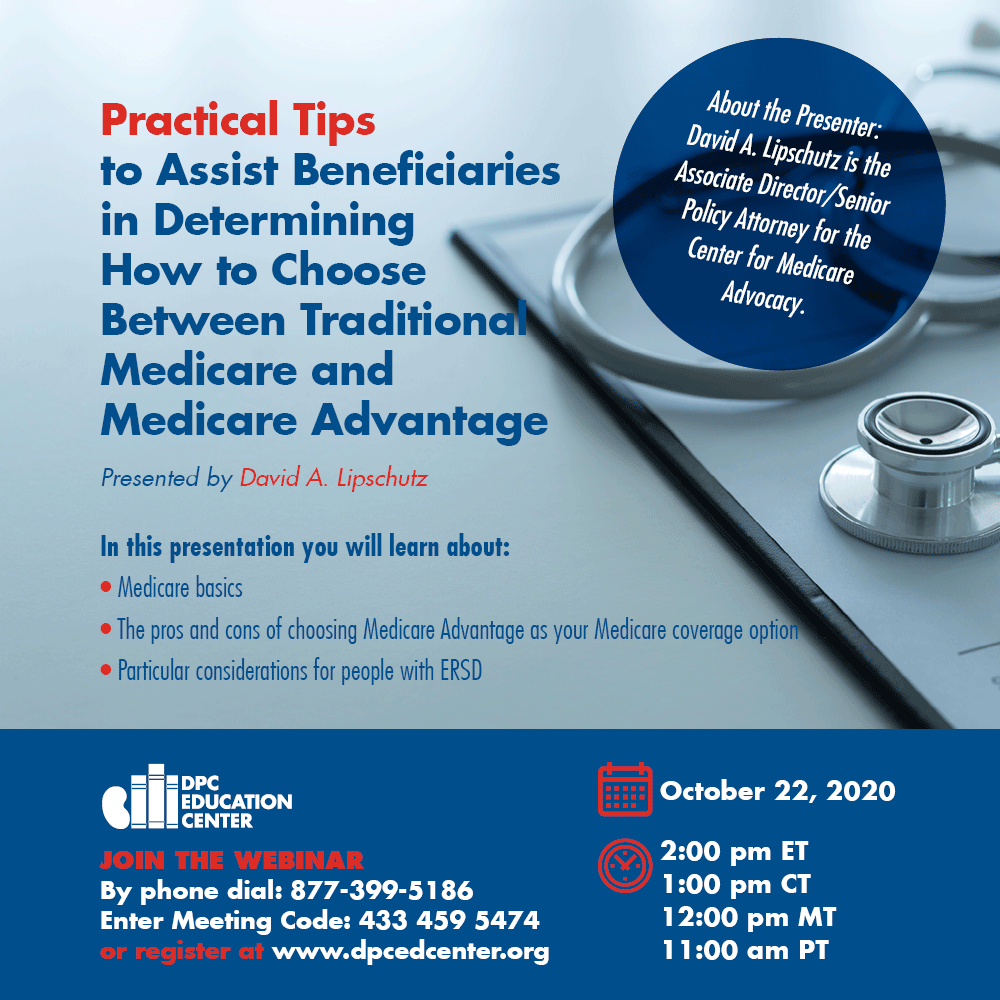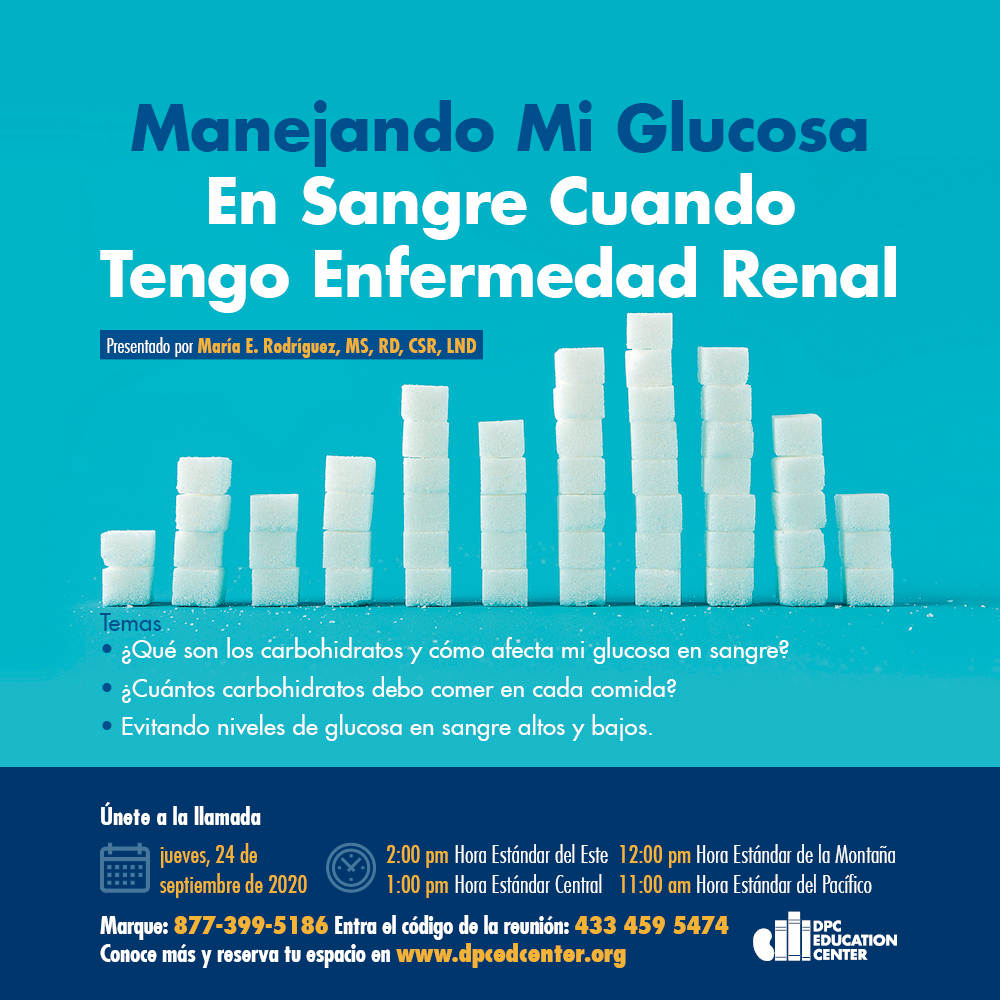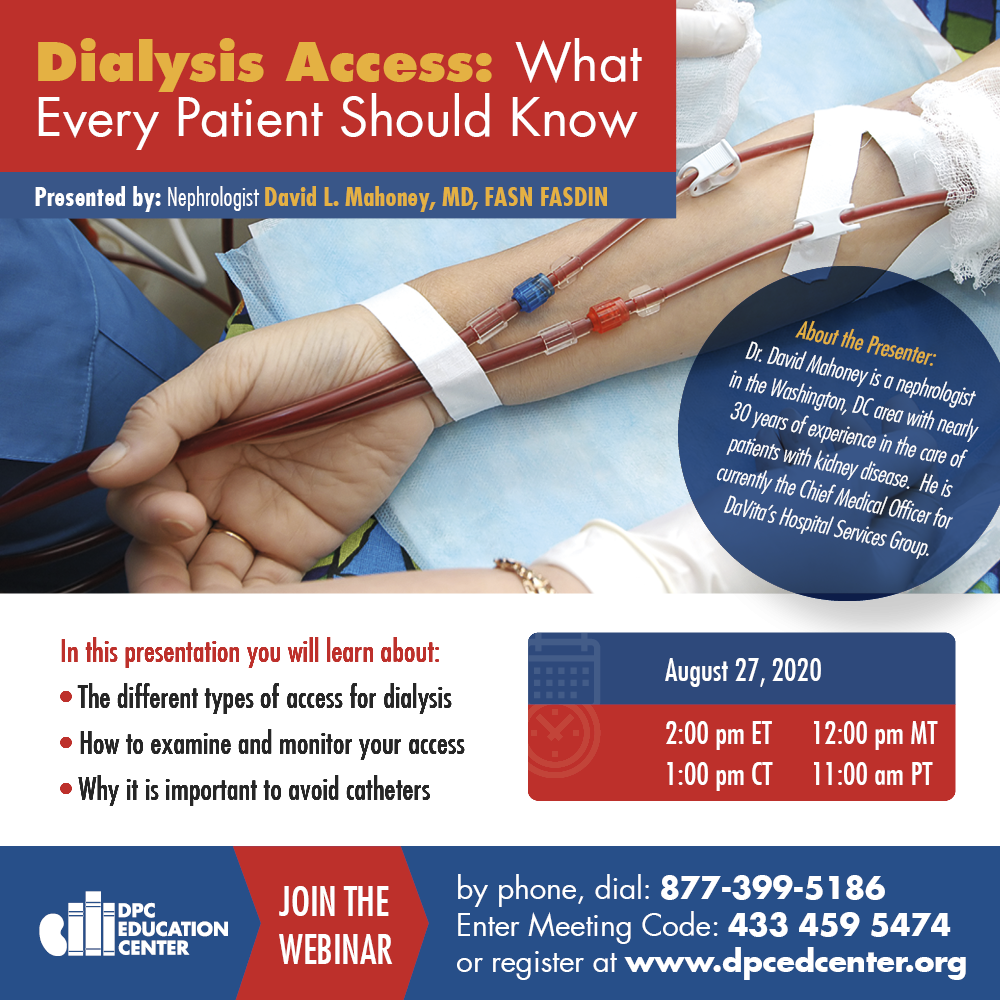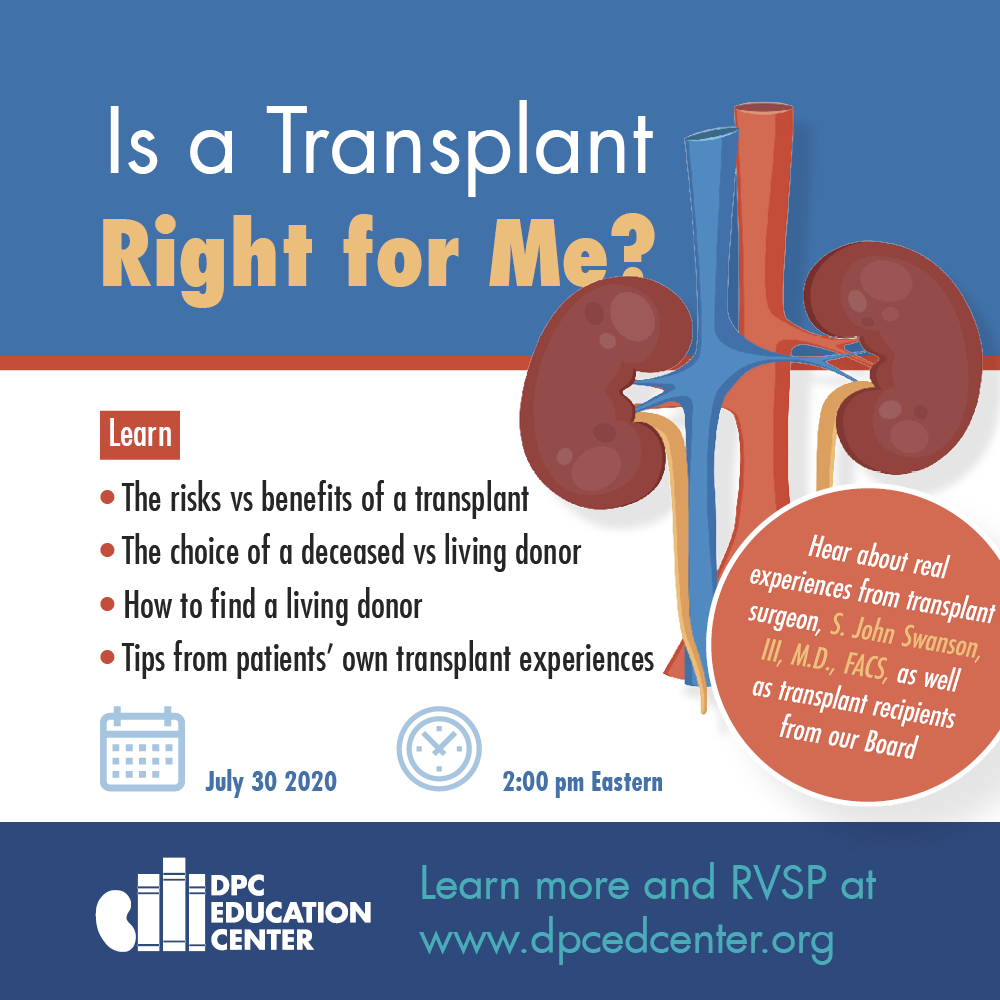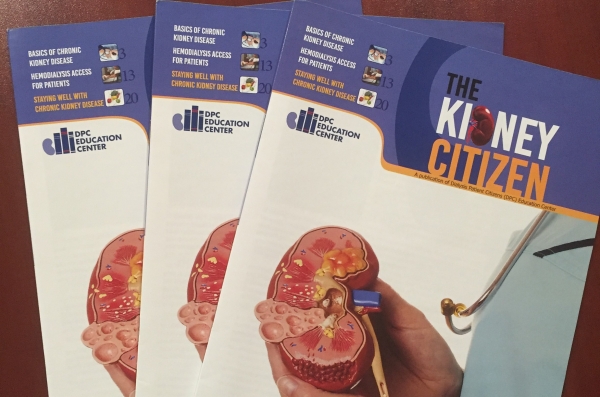News & Events
Discover new information and educational offerings that we provide. Explore our newsletters, blogs and upcoming webinars/conference calls.
Contents:
New Online Course About Exercise
The DPC Education Center just launched a new online course called: Exercise and the Benefits to You and Your Kidneys. Exercise is important for our physical and mental health. This course explains why exercise is important, how it benefits people living with kidney disease and how you can develop a personalized exercise program that will work for you. Check out the Course
ESRD Teen Booklets Are Now Available in Spanish
Our two popular booklets, "Tips for Teens Living with Kidney Disease" and "Kidney Disease Tips for Teens Living with Cystinosis" are now available for download in Spanish. These booklets provide information for teens who learn they have kidney disease. They include a brief overview of living with End stage renal disease, the importance of diet and medication adherence, and potential treatment methods. They also touch on feelings related to having a chronic illness, family and friends, and being a teen. Download the booklets
The Importance of Getting a Flu Shot During COVID-19
Flu season is approaching, and it is just as important to get your shot as ever before. People with chronic kidney disease are more susceptible to developing severe flu complications, due to a weakened immune system. The COVID-19 pandemic adds some complexities to flu season this year as there is risk for infection from either illness. Although there is no vaccine available for COVID-19, you can lower your risk for getting the flu by getting the flu vaccine. In fact, the flu vaccine prevented 39 percent of flu cases among people that received the vaccine last year. In addition, the types of activities people have been doing to prevent the spread of COVID-19—such as handwashing—will [...]
Practical Tips to Assist Beneficiaries in Determining How to Choose Between Traditional Medicare and Medicare Advantage
This webinar will discuss: 1) Medicare basics, 2) The pros and cons of choosing Medicare Advantage as your Medicare coverage option and 3) Particular considerations for people with ERSD.
Coping with Chronic Illness During COVID-19: How to Live Well in the Context of Stress
By Elizabeth Steinberg Christofferson, PhD An increasingly vital aspect of the COVID-19 pandemic is how the pandemic impacts our mental health, overall well-being, and how we cope with the pandemic, especially as it continues on for a longer period than we may have anticipated or hoped. This article provides psychoeducation on the connection between stress, chronic illness, and COVID-19, tips for managing anxiety related to these stressors, and resources for further support. Stress During COVID-19 and Symptoms to Look Out for COVID-19 adds to already present stress that impacts patients and families on many levels in terms of their medical and physical health, emotional and mental health, family, school, and social lives. Having a chronic [...]
Supporting Your Health and Wellbeing Before, During, and After Kidney Transplant
By Elizabeth Steinberg Christofferson, PhD and Leah Grande, MA Preparing for and receiving a kidney transplant, especially during the COVID-19 pandemic, can be an uncertain and overwhelming process. This article discusses tips to promote positive mental and physical health for yourself or your loved ones. Preparing for a Transplant There are many different emotions associated with deciding to go on the transplant list, and all of these feelings are normal and valid! You may feel excited about the potential for improved health and energy, fewer restrictions on what you can eat and drink (although you still want to eat a heart-healthy diet!), more time in your day, and changes in quality of life.7 Many [...]
Kidney Patients and Coronavirus: What Have We Learned?
By Alan S. Kliger, MD The COVID-19 pandemic has changed life for virtually everyone on the planet. For most of this year, we have all gone through many troubling emotions: fear, disbelief, anxiety, anger, mistrust, cynicism. We also have learned so much, and have looked to the future for trust, hope, anticipation, and most of all the ability to get on with life beyond face masks, social distancing, closed schools and closed businesses, and to a time we don’t have to worry every time someone walks toward us: might they be the one who infects me. In the midst of such upheaval, people with chronic kidney disease, including those who receive dialysis treatment or who [...]
Manejando Mi Glucosa En Sangre Cuando Tengo Enfermedad Renal
Temas: 1) ¿Qué son los carbohidratos y cómo afecta mi glucosa en sangre?, 2) ¿Cuántos carbohidratos debo comer en cada comida?, 3) Evitando niveles de glucosa en sangre altos y bajos.
Participating in a Clinical Trial
New medical treatments and products are continually being developed for people living with kidney disease. Part of the development process for high quality, scientific, and safe options is through research to test the treatment or product before it becomes available on the market. This phase of research is called a clinical trial or a clinical research project. People can volunteer to be part of a clinical trial if they meet the specific requirements for the study. You might consider participating in the research process for many reasons including if it has a personal meaning for you or if you want to give back in an effort to help other patients. Some clinical trials reimburse patients [...]
Living Well During COVID-19: How to Cope and Manage Your Emotions
During this webinar, Dr. Christofferson will offer advice on how to deal with feelings of fear, isolation, anxiety and stress during the coronavirus outbreak.
Dialysis Patients Should Continue to Prioritize Their Health
As officials across the country make decisions on how to safely reopen cities amid a global pandemic, people with End-Stage Renal Disease (ESRD) must remain vigilant about taking precautions to lower their risk for COVID-19 infection. COVID-19 cases and hospitalizations increased significantly among ESRD patients from May 16 to June 20, as reported by the Centers for Medicare & Medicaid Services. The number of kidney disease patients who were diagnosed reached 3,818 per 100,000 people, while hospitalizations were reported at 1,911 per 100,000 people. These rates are more than double that of the general population during that same time frame, demonstrating how vulnerable kidney patients may be as well as the need for continued vigilance. [...]
Guide for Submitting Emergency Grants
Emergency grants can help cover costs for transportation, medication, rent and food when someone is sick. This one-page guide will help you better understand the submission process with a summary of searching, preparing, applying and tracking grants. Included is a list of documents you may be asked to submit with your grant request. Reach out to your social worker if you need help. Check out the guide.
Dialysis Access: What Every Patient Should Know
In this presentation you will learn about: 1) the different types of access for dialysis, 2) how to examine and monitor your access and 3) why it is important to avoid catheters.
12 Tips to Cope with Chronic Disease
By Rachel Fintzy Woods, MA, MFT So many aspects of life are beyond our control. When the challenges of managing an illness such as chronic kidney disease are added to our plate, we can feel overwhelmed. Emotions such as anger, confusion, fear and sadness are common and natural, especially at the outset of our journey with illness. It can seem as if our world has been turned upside down. Yet we do have some say in how we deal with the cards we’ve been dealt, including our medical condition and life itself. We alone are responsible for our actions and our attitudes—the word “responsibility” refers to our ability to respond, after all. We can expand [...]
Public Health Service Guidelines on Organ Donation for HIV, HBV, HCV and Transplant Recipient Monitoring
The U.S. Public Health Service (PHS) recently released the PHS Guideline for Solid Organ Donor Assessment for Human Immunodeficiency Virus (HIV), Hepatitis B Virus (HBV), and Hepatitis C Virus (HCV) Infection and Transplant Recipient Monitoring. This document updates existing PHS guidance pertaining to solid organ donors and recipients and testing for HIV, HBV, and HCV in addition to informed consent and appropriately communicating the risk of disease transmission to transplant candidates. The revised guideline reflects substantial advances in testing technology and treatment that improve patient safety. Key things for you to know: Risk of infection due to transplant is very low. Advances in highly accurate testing have made it easier for healthcare providers to quickly [...]
Understanding Chronic Pain and Depression
How Chronic Pain Can Impact Your Mental Health When You Have Kidney Disease By Hannah Calkins Chronic pain and depression are closely linked and because as many as 60 percent of hemodialysis patients report moderate to severe chronic pain, it’s likely that many of them have experienced depression—or are at risk for it. But it may not look or feel the way you expect, according to psychologist Robert Kerns, PhD. “Depression among people with chronic pain may not be experienced as profound sadness,” says Kerns, a professor of psychiatry, neurology and psychology at Yale University. “Other symptoms may be more likely to be present, including loss of interest or engagement in activities you normally enjoy, [...]
Care Coordination Fixes One of the Biggest Flaws in the American Health Care System
By Gloria Rohrer, DPC Patient Ambassador As a dialysis patient, it has become clear to me that one of the biggest flaws in the American health care system is the disjointed way care is often provided to patients. If patients have chronic conditions alongside other health complications, it can be exceedingly difficult to navigate the different doctors and hospitals we need in order to receive proper care. When seeing so many different doctors at various clinics and hospitals, patients like me can suffer adverse effects if all our treatments are not designed to address our full medical history, rather than a single disease. This can be because of a lack of communication between our care [...]
Identifying Sepsis Risk and Symptoms
By Marijke Vroomen Durning, RN People who live with kidney disease are more susceptible to contracting infections than the general public. A weakened immune system, frequent hospital or clinical visits/stays, and possible points of entry for infection (catheters, ports, etc.) all contribute to this increased risk. Unfortunately, some of these infections can lead to sepsis, which can be life altering, even fatal for thousands of people. Sepsis is your body’s inflammatory response to an infection. It can be any type of infection—viral, as with influenza; bacterial, as with a urinary tract infection (UTI); even fungal or parasitic. No one knows why two people may get the same infection, but one may develop sepsis while the [...]
Is a Transplant Right for Me?
During this webinar You will learn about 1) The risks vs benefits of a transplant, 2) The choice of a deceased vs living donor, 3) How to find a living donor, and 4) Tips from patients’ own transplant experiences.
4 Cereales integrales para incorporar en tu alimentación
Por María Eugenia Rodríguez León, MS, RD, CSR, LND, Nutricionista Dietista Licenciada https://menutritionpr.com Una de las recomendaciones para llevar una alimentación saludable es que la mitad de los cereales y farináceos que comemos sean integrales. Se ha demostrado que los cereales y farináceos integrales ayudan en la prevención de algunas enfermedades (ej. diabetes, cáncer, alta presión y enfermedades cardiovasculares).1 Un grano integral tiene las tres partes originales de la semilla: salvado, germen y endospermo.2 Salvado: es la parte comestible del exterior de la semilla. Contiene antioxidantes, vitaminas del complejo B y fibra. Germen: es el embrión de la semilla. Es la parte que tiene el potencial de convertirse en una planta nueva. Contiene vitaminas [...]


